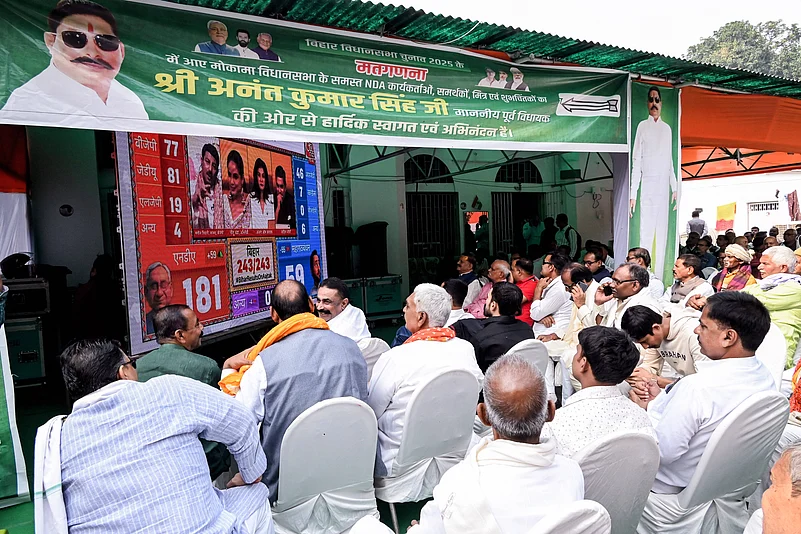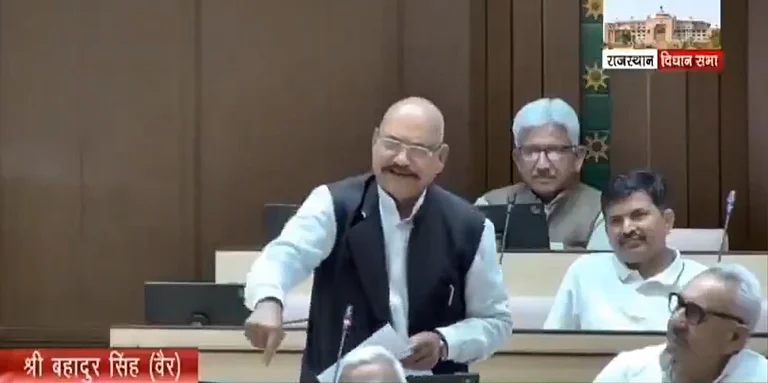
Six NDA MLAs are accused of murder, while 14 BJP and JD(U) MLAs face attempted murder charges, directly contradicting the alliance’s “good governance” narrative.
Six NDA legislators are booked in cases related to crimes against women, exposing a disturbing gap between promises of safety and political reality.
More than half of Bihar’s Assembly — 130 out of 243 MLAs — face criminal cases, revealing the deep normalisation of lawlessness in the state’s electoral politics.
For months, the BJP-led National Democratic Alliance campaigned in Bihar on a simple, effective slogan: the return of sushasan — good governance. On the stump, Prime Minister Narendra Modi repeatedly dredged up the spectre of the Lalu Prasad Yadav era, casting it as an age of fear, lawlessness and moral decay. The phrase “Jungle Raj” echoed from rally to rally. Modi sharpened the image further by invoking the katta, the crude, country-made pistol that became a symbol of Bihar’s violent past.
“Jungle Raj was the darkness that slowly eroded Bihar,” the prime minister told cheering crowds. “Cruelty, bitterness, lawlessness, corruption and bad governance — that is what defined the RJD’s rule.”
The rhetoric worked. The NDA swept back to power, riding on a promise of order, stability and clean government. But a closer examination of the very affidavits filed by the alliance’s victorious candidates tells a far more unsettling story — one that seriously undermines the moral superiority on which the campaign was built.
An analysis of nomination papers by the Association for Democratic Reforms (ADR) reveals that the new Bihar Assembly, far from representing a clean break from the past, is riddled with serious criminal allegations — particularly among the NDA’s own ranks.
Murder in the House
According to ADR, six NDA MLAs face murder charges in their affidavits. Three belong to the BJP: Siddharth Saurav (Bikram), Kedar Nath Singh (Baniapur) and Shyam Babu Prasad Yadav (Pipra). The other three are from the Janata Dal (United): Anant Kumar Singh (Mokama), Amrendra Kumar Pandey (Kuchaikote) and Sribhagwan Singh Kushwaha (Jagdishpur).
These are not obscure footnotes. These are sitting legislators — now part of the ruling establishment — accused of the most serious crime under the law. Their presence in the Assembly is a chilling reminder that in Bihar, political power and criminality remain disturbingly intertwined.
“The promise of sushasan rings hollow when six sitting MLAs of the ruling alliance are accused of murder and crimes against women,” says Aneesh Ankur, a Patna-based political commentator and analyst. “What we are seeing is not a clear break from the past, but a repackaged version of it.”
Attempted Murder: A Pattern, Not an Exception
The pattern extends even further in cases related to attempted murder. According to ADR, both the BJP and the JD(U) have seven MLAs each with cases under IPC Section 307, a charge that reflects intent to kill, even if the act did not result in death.
Among the BJP legislators facing such cases are Siddharth Saurav (Bikram), Kedar Nath Singh (Baniapur), Subhash Singh (Gopalganj), Anil Singh (Hisua), Dr Sunil Kumar (Biharsharif), Mangal Pandey (Siwan) and Rakesh Ranjan (Shahpur).
The JD(U)’s list is no less troubling: Anant Kumar Singh (Mokama), Ajay Kumar (Minapur), Pramod Kumar Singh (Rafiganj), Shyam Rajak (Phulwari SC), Sribhagwan Singh Kushwaha (Jagdishpur), Chetan Anand (Nabinagar) and Amrendra Kumar Pandey (Kuchaikote).
These are the names that now sit at the centre of Bihar’s governance. They help pass laws, approve budgets and shape public policy. And yet, their own personal records raise serious questions about the nature of justice, accountability and political culture in the state.
Crimes Against Women: The Quiet Crisis
Perhaps the most alarming category in the ADR data concerns crimes against women. In a state where violence against women remains an urgent social crisis, the fact that six NDA MLAs face such allegations is impossible to ignore. According to the report, three BJP MLAs, two JD(U) MLAs and one LJP (Ram Vilas) MLA have cases that fall into this category — including offences such as assault on women, harassment, domestic cruelty and violations under the Dowry Prohibition Act.
One of them, Mangal Pandey of Siwan, appears both on the list of attempted murder cases and crimes against women — making him a striking symbol of the troubling overlap between political authority and serious criminal accusation.
Taken together, the message is stark: the same alliance that framed itself as Bihar’s moral saviour now governs it with a significant contingent of legislators accused of serious violence, including violence against women.
The Bigger Picture: Normalised Criminality
Zoom out further and the picture becomes even more devastating. Out of Bihar’s 243 MLAs, 130 — more than half — have criminal cases registered against them. Even more shocking, 102 legislators (around 42 per cent of the entire Assembly) face charges categorised as “serious criminal cases,” including murder, attempted murder, kidnapping, and crimes against women.
Within the NDA specifically, the numbers are staggering. Forty-three of the BJP’s 89 MLAs and 23 of the JD(U)’s 85 MLAs fall under the “serious crimes” bracket.
The implication is inescapable: criminality is no longer an aberration in Bihar’s politics — it is a structural feature. Elections have become less about cleansing the system and more about managing, normalising, or even rewarding those with violent pasts and powerful local networks.
“It would be factually correct to use the term ‘Jungle Raj’ for the NDA regime as well, if one goes by the crime rate and the nexus ruling party politicians have with criminal elements,” Ankur says bluntly.
The tragedy of Bihar’s political cycle is not simply the presence of criminal elements — it is the public exhaustion that now surrounds their existence. Election after election, voters are promised clean governance, rule of law, and systemic reform. And election after election, the same patterns resurface under new banners and freshly minted slogans.
The NDA’s victory was sold as a civilisational correction — the defeat of “Jungle Raj” and the embrace of development and discipline. Instead, what emerges from the data is a sobering continuity: a state where power still flows through fear, influence, and impunity.





























